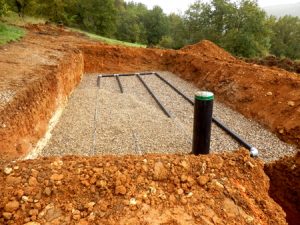 Before you have a septic system installed on your property, it’s important to have your yard’s soil tested to ensure that it will be able to handle everything that the septic system throws at it. Your soil will have a very important job, as it will be responsible for helping dispose of the effluent that leaves your septic tank and eventually makes its way to your septic system’s drain field. There must be organisms within the soil that are capable of feeding on and removing any bacteria that remains in your effluent once it reaches the drain field. Otherwise, you could find yourself with big problems on your hands, and your septic system might not work as well as you had hoped.
Before you have a septic system installed on your property, it’s important to have your yard’s soil tested to ensure that it will be able to handle everything that the septic system throws at it. Your soil will have a very important job, as it will be responsible for helping dispose of the effluent that leaves your septic tank and eventually makes its way to your septic system’s drain field. There must be organisms within the soil that are capable of feeding on and removing any bacteria that remains in your effluent once it reaches the drain field. Otherwise, you could find yourself with big problems on your hands, and your septic system might not work as well as you had hoped.
There are certain types of soil that are not ideal for septic systems, and if you happen to have them in your yard, it can lead to ground and surface water contamination near your home. Clay soils, for example, are typically very compact and don’t provide enough room for effluents to flow through easily. This can create drainage issues in your yard and cause your septic system to back up. On the other hand, soils that consist primarily of gravel and are very coarse can allow effluent to pass through too quickly. In this situation the effluent isn’t filtered by the soil at all, and that too can cause problems in your yard
The best soil for a septic system falls somewhere in between clay and gravel.
It’s not too dense but it’s also not too loose. It’s a mixture of the two, which allows for your soil to filter the effluent created by your septic system while also draining it and keeping the septic process moving. If your septic system is installed in an area with unsuitable soil, you’ll be bound to find all kinds of issues in the future, so it’s essential to have a soil test done in advance.
Have some more lingering questions about septic system installation and repair? Give us a call today at (410) 795-2947 or stop into one of our four convenient locations to speak with a representative.


Leave a Reply
You must be logged in to post a comment.